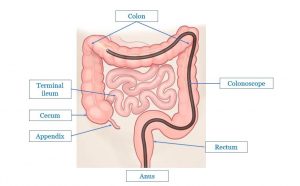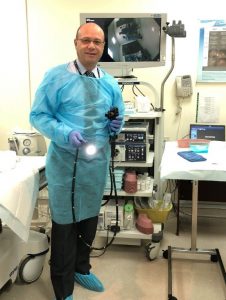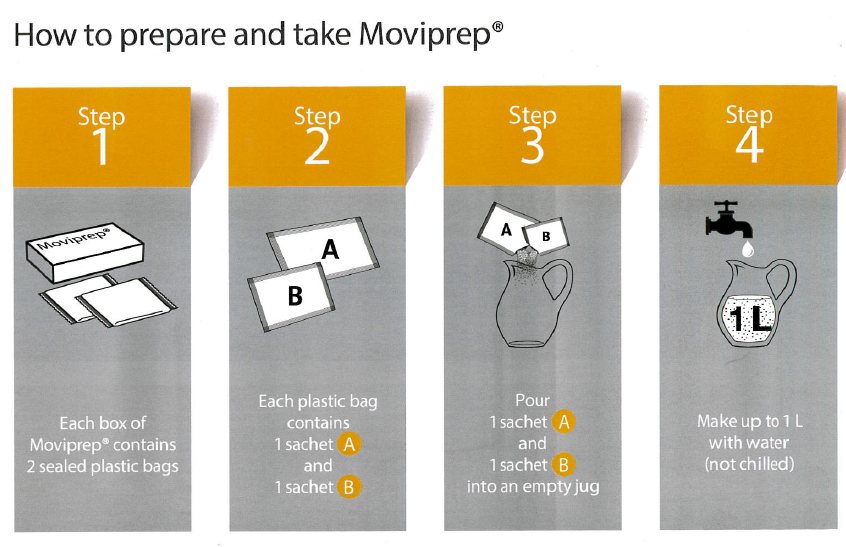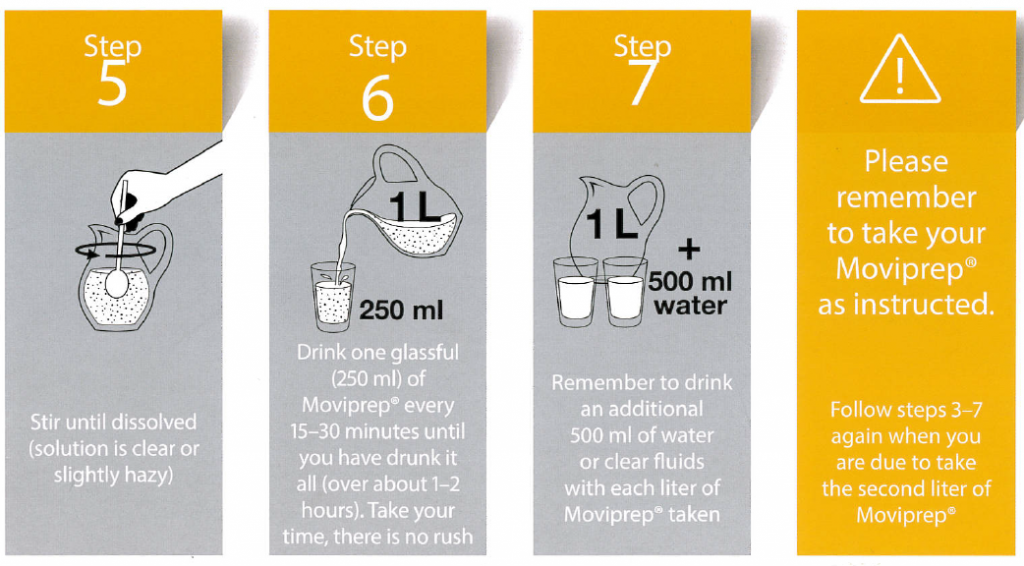What is colonoscopy?
Colonoscopy is a procedure that examines the colon and rectum [Figure 1]. A thin flexible tube with a tiny video camera at the tip is inserted through the anus and advanced all the way into the first portion of the colon called cecum [Figure 2]. In some situations, the terminal ileum (the last portion of the small intestine is viewed). The procedure is performed to check for conditions such as inflammation, ulcerations, infection, polyps, and tumors. The procedure is performed in the endoscopy suite by Dr. Maher Abbas. The procedure takes 20 minutes or longer depending on your condition. It is usually performed under intravenous sedation with medications. During the procedure, small pieces of the lining of the digestive tract (biopsies) can be taken for evaluation under the microscope. If polyps are encountered they are either removed or biopsied.
When you arrive at the endoscopy suite, you will meet a nurse who will briefly review your medical history. You will change into a hospital gown and have your vital signs measured. You will have an intravenous (IV) line placed in your arm. This IV line will be used to provide your sedating medications during your procedure. You will be taken on a stretcher to the procedure room and you will be met by your doctor and the nurses. You will be given oxygen, and your blood pressure, heart rate and breathing will be monitored throughout the entire procedure.

Figure 1 – Colonoscopy

Figure 2 – Colonoscope
What are the risks of colonoscopy?
Colonoscopy is a safe procedure and Dr. Maher Abbas has performed thousands of endoscopic procedures. Minor risks include transient dizziness, medication reaction, nausea, abdominal discomfort with bloating and gas. Major complications are extremely rare and consist of bleeding or perforation (a small hole) which is usually treated endoscopically but on rare occasions can require hospitalization and another endoscopic or surgical procedure.
How do you prepare for the procedure?
It is very important to follow the instructions in order to thoroughly cleanse your intestine. This improves the quality of the procedure and allows Dr. Maher Abbas to perform a high-quality examination. A poor preparation can lead to suboptimal examination with possible cancellation and the need to repeat the procedure.
If you have severe constipation (have a bowel movement less frequently than twice a week), ask Dr. Maher Abbas for further instructions.
Step 1 – When you schedule colonoscopy
Pick up the medications from pharmacy ahead of time.
If you take medications for diabetes, blood thinners, aspirin, or non-steroidal anti-inflammatory medications (medications used for pain, arthritis, or headaches, such as ibuprofen, naproxen, diclofenac, ericoid), or have a heart condition, let Dr. Maher Abbas and his nurse know at the time when you book the procedure.
Stop any iron (including multivitamins with iron), 1 week prior to colonoscopy.
Step 2 – Two days before your procedure
You can eat but avoid foods that are difficult to digest such as nuts, seeds, bran, popcorn, all vegetables, fruits, and salads.
Step 3 – On the day prior to your colonoscopy
STANDARD PREPARATION
[if your colonoscopy is scheduled in the morning]
Starting at 8:oo am (morning), begin a clear liquid diet for breakfast and lunch [see below diet]. NO SOLID FOOD or thick liquid the day prior to colonoscopy.
At 5:00 pm (afternoon), begin the Moviprep® preparation. Mix the content of 1 sealed plastic bag and drink as below instructions. Once done with 1st sealed bag, repeat the same steps with the second sealed bag. After the preparation is done you can drink water, apple juice, white grape juice, light tea, black coffee, and carbonated beverages until 6 hours prior to the procedure.


SPLIT PREPARATION
[if your colonoscopy is scheduled in the afternoon]
Follow the above instructions but take the content of the 1st sealed bag at 7:00 pm. Repeat with the 2nd sealed bag starting 5:00 am the morning of the day of procedure. After the preparation is done you can drink water, apple juice, white grape juice, light tea, black coffee, and carbonated beverages until 6 hours prior to the procedure.
CLEAR LIQUIDS
The type of liquids you can see light through such as: water, clear fruit juices (apple, white cranberry, white grape), beef or chicken broth, ginger ale, carbonated beverages (Sprite, 7-UP, tea (no milk), Popsicles, and Jelly (no red colors or dyes).
You can have yogurt, plain ice cream, sherbet, honey, and syrups.
- Do not drink anything that has RED DYE (no red dyes)
- Do not eat solid foods
- Do not drink milk or creamers
Step 4 – On the day of your procedure
Kindly arrive 1 hour prior to your scheduled time to avoid delays or possible cancellation of your procedure (Dr. Maher Abbas runs a busy and tight schedule). Report to the admission desk. You will need a driver to take you home. The entire process can take up to 3-4 hours. If you take heart or blood pressure medications you can take with a small sip of water as soon as you get up.
Post colonoscopy care
Activity
Immediately after the procedure, you will rest for 30 to 60 minutes in the recovery area. It is best to take the remainder of the day off work and avoid making critical decisions because of the sedative you will be given. You can resume your usual activity the following day. If biopsies are taken, avoid strenuous activity or vigorous exercise such as bicycle riding, jogging, weight lifting, or aerobic exercise for 1 week. You can drive starting the following day.
Diet
Once you recover from the sedative given during your procedure, you will receive your first meal in the recovery area of endoscopy suite. If you have nausea, it is best to remain on a liquid diet for the rest of the day. If you drink alcohol, refrain from such beverages the day of your procedure.
Medications
You can resume your home medications. If you are on any blood thinner, ask Dr. Maher Abbas for specific instructions. If you have discomfort you can take 1 to 2 acetaminophen 500 mg pill every 8 hours [panadol, paracetamol, tylenol] or start any medication prescribed by Dr. Maher Abbas. Drink plenty of water.
Signs to watch for
If biopsies are taken during the procedure, a very small amount of dark or streaks of fresh blood can be expected with the first bowel movements. Colonoscopy is a safe procedure. If any of the following symptoms occurs, contact Dr. Maher Abbas’ office and come to the emergency department immediately:
- Chest pain, racing heart beats, or shortness of breath
- Fever with Temperature >38 ° Celsius, >100.4 ° Fahrenheit
- Persistent nausea, vomiting
- Persistent rectal bleeding with clots or bright blood
- Redness and pain at the medication injection site
- Severe abdominal pain with distention or continuous spasm
Follow-up appointment
The proper follow-up appointment will be scheduled. If medications are prescribed, pick up from the pharmacy and take as instructed. If biopsies are taken, the results will usually become available within a week.
Any questions? Contact Dr. Maher A. Abbas’ office nurse here.
